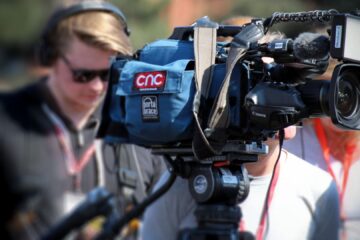![]()
Better storytellers have stronger hands in trials and media is always the best storyteller, JUSTICE is only the media’s story.
Introduction:
Media Trial occurs when the media takes a particular case in hand and by presenting solid or vague facts tries to prove that a certain person is guilty or not guilty even before the court has declared him so. Sometimes such a trial is necessary when important facts are kept secret from the general public. Media is the only platform through which a layman can know what the truth is. It works as a watchdog for the public.
Human Rights and Freedoms
Freedom of speech guarantees a person to speak without the fear of retaliation, censorship, or legal sanction. This is a human right as declared by UDHR. Article 19 of UDHR states that “everyone shall have the right to hold opinions without interference” and “everyone shall have the right to freedom of expression; This right shall include freedom to seek, receive and impart information and ideas of all kinds, regardless of frontiers, either orally, in writing or print, in the form of art, or through any other media of his choice.” [1]
Article 19(1) (a) of the Indian constitution provides that “all citizens shall have the right to freedom of speech and expression”.[2] In Ramesh Thappar vs the State of Madras[3], it was observed that “Freedom of speech and the press laid at the foundation of all democratic organizations, for without free political discussions no public education, so essential for the proper functioning of the process of popular government, is possible.”
This fundamental right provided by the Constitution of India is not absolute and subject to restrictions applied by the state looking at:
- Security of state- Protection of state and social structure and the territorial integrity and independence of the state from subversive activities. The rebellious act against the government, crime of violence intended to overthrow the government.
- Friendly relations with foreign states- This type of restriction is to prevent malicious propaganda. Such restrictions can’t be used to stop the criticism of foreign policies.
- Public Order- Minor breaches of public order are not considered a violation of freedom of speech. It is the same as public safety, peace, and tranquillity.[4]
- Decency or Morality- Such restriction is made so that any speech or thought may not vilify public morals.
- Contempt of Court- no one should disregard or show disrespect to authorities and judgment given by them. Supreme Court and High Court have power under Article 129 and Article 215 respectively. To punish for its contempt.
- Defamation- Right to reputation is a thing the same as the right to freedom of speech and expression. Hence, no person has a right to disregard someone’s reputation by exercising his right to speak.
- Incitement of offense- Incitement of any crime is punishable and it shall not be excluded by taking the defense of freedom of speech.
- Integrity and Sovereignty of India- This can also be the ground to put restrictions on as no person can affect India’s integrity and sovereignty by speaking unnecessarily.
Freedom of the Press is one of the parts of the Right to speech and Expression. Supreme Court in various judgments has mentioned the importance of Free Press in a democratic society. Press makes the layman aware of the happenings of the world by presenting their facts, figures, and opinions. But as everything has its good and bad effects, similarly Freedom of Press if exercised in a malicious way it can affect a person’s and his/her family’s reputation adversely.
The concept of giving freedom to media was to reflect the right to information of citizens; it was further made clear by the Right to Information Act, 2005. With this evolution, it comes on the shoulder of the press to work cautiously about what they are delivering to a group of 138 crores. In the case of R.K. Anand vs Registrar, Delhi High Court[5], it was noted with some severity that free speech did not include the right to publish just any kind of report concerning a matter before the court or to carry out sting operations on some matter concerning a pending trial.
Both Media Trials and Freedom of speech go hand in hand. When a particular case is taken by media in its hand, they leave no stone unturned whether right or wrong. Unlike the judiciary, they are not bound to give justice to the sufferer or victim. They don’t understand the concept of INNOCENT UNTIL PROVEN GUILTY. Generally, their main motive is to attract as many viewers as they can by presenting a set of news earlier than any other channel. For that, they make up facts and opinions which are sometimes true and sometimes false. But this trial based on proved, not proved, relevant, irrelevant facts and opinions can derange someone’s life.
Positive Effects of Media on Certain Cases
Following are the cases which show positive effects of media trial and apt usage of freedom of speech and expression:
- Jessica Lal Case – In this case, the accused belonged to an influential family and in the trial, all the key witnesses turned hostile and evidence was also manipulated. But media showed great efforts and despite political pressures exposed the inaccuracies in the trial and witness, resulting in the conviction of the accused.
- Nirbhaya Case – Media, in this case, has presented the whole story as awareness and learning to the society which has drawn the attention of the public towards such serious issue of punishment of a rape victim and also towards minors involved in such heinous act.
- Sanjeev Nanda Case – In this particular case the accused was saved due to a lack of evidence against him. But media exposed the negligence of the police, and the case was reopened. It showed the influence of media on legislature and executive on demand of the public.
There are many examples like this where media has utilized the right to speech and expression appropriately. But there are opposite examples of where media has torn apart the reputation of many celebrities as well as laymen.
If we look into the case of Sushant Singh Rajput, the media has left no door for many celebrities questioned in that particular case. Forgetting the whole concept of AUDI ALTERM PARTEM[6] they have spit on the face of these celebrities. Rhea Chakraborty’s character has been put to the question before even understanding her involvement in the death of Sushant Sing7h.
The present case on the custody of Aryan Khan is the recent example for wrongly exercising the Right to Freedom of expression and speech. In this Shahrukh Khan has been deliberately questioned on his teaching and nourishment gave by him to his son. Media like always is giving this case a title of RELIGION. Aryan Khan is one of the 20 people arrested by NCB but the only name which is everywhere is ARYAN KHAN.
In the case of Siddhartha Vashishth vs State NCT of Delhi the court made the important distinction between trial by media and informative media. The case of Sahara vs SEBI is a review of the case law on the point, and it reinforces the line between legitimate comment and usurpation that affects the presumption of innocence.
The essential difference is captured by the terms used in the Siddhartha Vashishth judgment, “informative expression” and “trial by media”. Where the people are informed of news and views, it is a legitimate expression that cannot be restrained, however unpalatable it may be to some.
Conclusion
India needs productive changes in press or media working, in any case, essential measures ought to be taken so their right to speak freely and articulation is not shortened. All in all, an administrative authorization supplanting the Press Council of India Act or reinforcing of similar demonstration and severe measures for uncalled media preliminaries that run corresponding to the courts ought to be embraced and checked.
References:
[1] UDHR, art. 19
[2] INDIA CONST., art. 19, cl. a
[3] [AIR 1950 SC 124]
[4] A. R. Lakshmanan and V. R. Manohar (rev.), D. D. Basu, SHORTER CONSTITUTION OF INDIA, Vol. 1, 14th ed. 2009, p. 281.
[5] (2013) 1 SCC 218
[6] Hear the other side



0 Comments